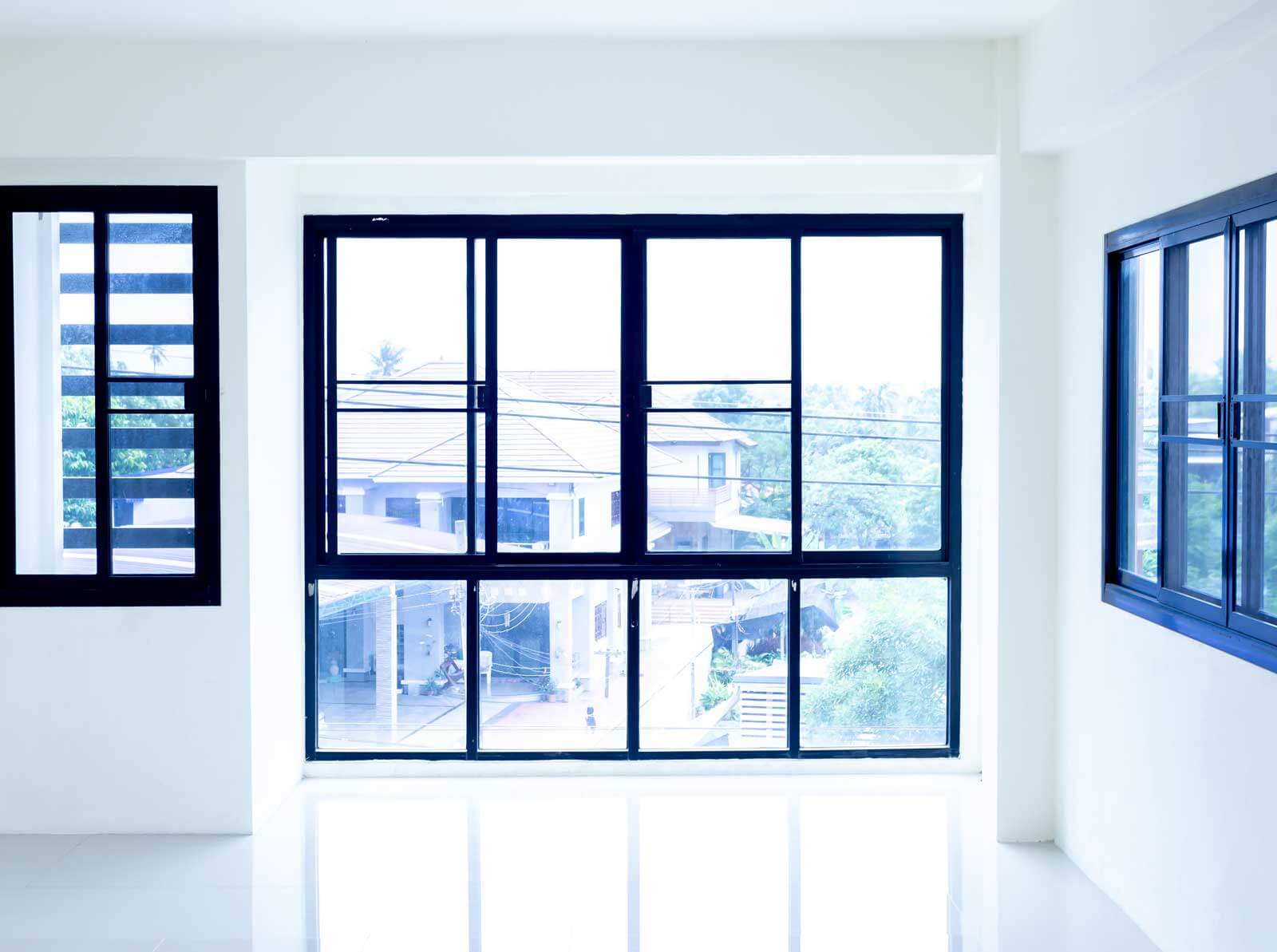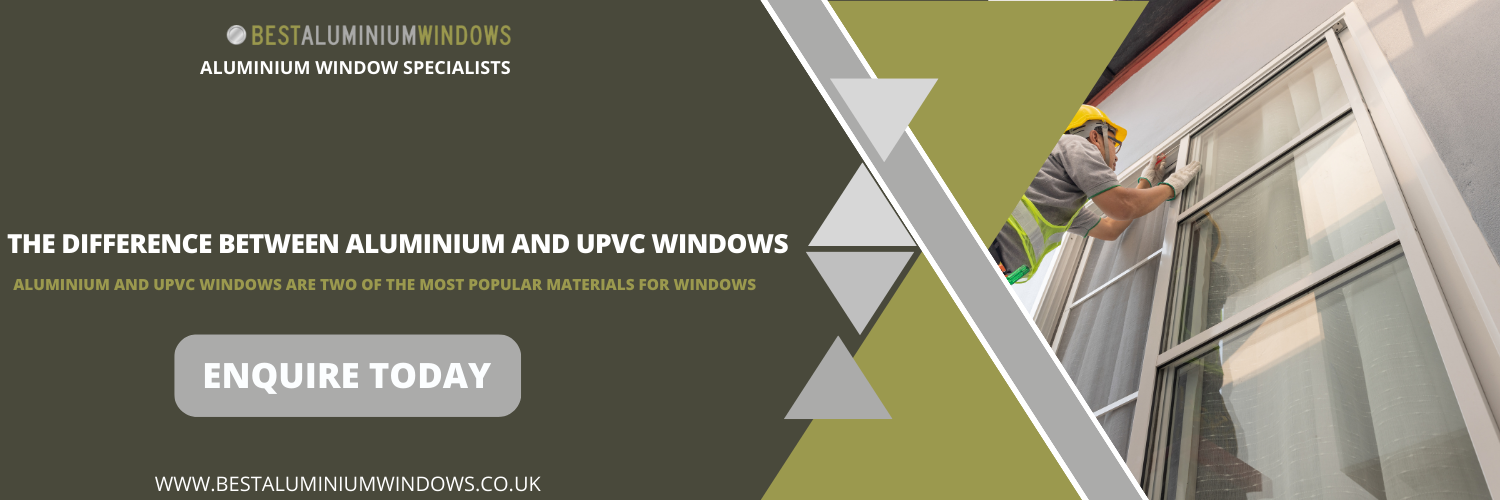20+ Years Experience
Specialist Windows

Enquire Today For A Free No Obligation Quote
Aluminium and uPVC windows are two of the most popular materials for window frames in modern construction.
In this article, we will explore the differences between these two materials, looking into aesthetics, pricing, maintenance, energy efficiency, durability, and much more.
We have compiled all the essential information, providing advice and insight on what factors to consider when selecting between aluminium and uPVC windows, as well as exploring the cost difference and various associated benefits of each material.
With all this knowledge and our comprehensive guidance, you should have all the answers needed to make an informed decision about which type of window is best for you.
Aluminium windows offer a range of advantages, including strength, lightweight construction, durability, weather-resistance, and longevity.
These slim-profile frames are an attractive option for modern homes and apartments and come in a variety of styles to suit any aesthetic.
Aluminium windows boast a modern, attractive aesthetic, are available in a wide range of RAL colours, feature slim sightlines that allow for an abundance of natural light, and are both robust and thermally efficient.
When compared to uPVC windows, aluminium windows offer excellent durability, weather resistance, low maintenance, and energy efficiency, with a range of styles and finishes, as well as good thermal insulation.
Additionally, aluminium windows are renowned for their excellent thermal and acoustic insulation.
This makes them an ideal choice for those seeking an environmentally friendly, energy efficient and soundproof window solution.
uPVC windows are made up of durable frames constructed out of unplasticised polyvinyl chloride.
The frames are then filled with glass panes to form the window. They are a cost-effective, long-lasting solution that requires minimal upkeep.
They are energy efficient, weatherproof, and provide excellent thermal insulation.
uPVC windows are typically more cost-effective than aluminium windows, however when it comes to durability, aluminium windows are more resilient than uPVC windows.
Aluminium windows possess a greater longevity than uPVC windows.
When making a decision between uPVC and aluminium windows, one should consider the style of the house, the needs of the homeowner, and the budget available.
Aluminium windows offer a range of advantages, particularly when appearance is a key factor.
When compared to timber or aluminium, uPVC windows may not be suitable for all property styles due to their lack of slender sightlines.
Additionally, uPVC windows offer superior soundproofing compared to aluminium or timber windows, effectively blocking out external noise.
uPVC windows offer a wide range of colours for this type of window. Aluminium windows are even more varied, with up to 150 RAL colours to choose from.
Aesthetics are of paramount importance when making a decision between window types such as uPVC and aluminium windows.
This is because the style of the windows should be in harmony with the property and its surrounding environment.
uPVC windows boast a thicker frame and come in a variety of hues, whereas aluminium windows feature a more slender frame and offer a broader selection of colours.
uPVC windows are the optimal choice for listed buildings or buildings situated in conservation areas.
When making a decision on the ideal window style for a property, it is important to consider the environment in which the building is situated, the aesthetic that would best complement the property’s location, and the amount of natural light the windows will allow into the property.
When making a decision between uPVC and aluminium windows, aesthetics should be taken into account.
uPVC windows have a thicker frame and come in a variety of colours, while aluminium windows have a slimmer frame and offer a greater range of colours.
Generally uPVC windows are more cost-effective than aluminium windows in the UK.
The average price of uPVC windows is £325 compared to the average price of aluminium windows at £475.
This price difference is due to the higher cost of producing aluminium as a metal compared to the plastic used in uPVC windows, leading to aluminium windows being 30% to 40% more expensive than uPVC windows.
When choosing between uPVC and aluminium windows, there are certain measures that can be taken to reduce the cost.
For example, opting for a more basic aluminium window installation or supplementing a uPVC installation with additional features to achieve a comparable cost.
Additionally, the design of the window itself can affect the price of window installation, so it is important to consider the key benefits and drawbacks of each window material type to make an informed decision.
uPVC and aluminium windows are renowned for their durability and require minimal maintenance. Cleaning and upkeep are straightforward and can be done with ease.
One of the many benefits of uPVC windows is that they require minimal maintenance to keep them in optimal condition.
Cleaning them with a mild detergent and a soft cloth or sponge is recommended at least every six months.
To ensure optimal performance of aluminium windows, it is recommended to clean them with a mild detergent suitable for metal surfaces and a non-abrasive cloth or sponge.
Additionally, the frames should be washed with a soap and water solution at least every six months.
Moreover, the friction stays and locking mechanisms should be lubricated on a regular basis to minimise wear.
When investing in locks for windows, it is important to prioritise quality.
Look for locks that meet industry standards and have been tested for their strength and durability to ensure the highest level of security.

Energy efficiency in windows is essential to reducing energy consumption and energy bills.
Aluminium and uPVC windows both provide comparable levels of insulation and energy efficiency.
Double glazed windows offer an additional layer of insulation, thus helping to reduce heat loss and enhance energy efficiency.
When considering energy efficiency, aluminium windows are the more cost-effective option in the long run due to their superior durability and energy efficiency compared to uPVC windows.
Furthermore, aluminium windows have a British Manufacturing Status Accredited seal which ensures that the product is manufactured to the highest standards for energy efficiency and thermal performance, providing excellent acoustic insulation, thermal break, and excellent thermal efficiency.
Additionally, aluminium windows are also more environmentally friendly due to their low maintenance and energy efficient design, which helps to conserve energy and reduce carbon emissions.
They are also suitable for use in conservation areas, listed buildings, and other sensitive areas due to their weather resistant and thermal break features.
Aluminium windows typically have a lifespan of 30-45 years, although this can be extended with appropriate maintenance and care.
Variables such as the quality of the material, climate conditions, installation method, and upkeep practices can all influence the longevity of the windows.
Aluminium windows are highly cost effective and their longer lasting material makes them an excellent choice.
Aluminium windows do not directly cause condensation, however, they can contribute to it if not adequately insulated.
Adequate insulation is essential to reduce condensation on aluminium windows.
This can be accomplished through the use of double glazing or triple glazing, low-emissivity coatings, and thermal breaks, which help to reduce the transfer of heat from the interior to the exterior.
The powder coated finish of aluminium windows also helps to reduce the amount of maintenance required, making them an excellent choice for those looking for a low maintenance window with excellent thermal efficiency.
The key benefits of aluminium windows are the excellent security and weather resistance they provide, their long lifespan, and the environmentally friendly materials used.
The excellent thermal efficiency of glass and insulation ensure that heat is not lost in the winter and retained in the summer, leading to better insulation, reduced energy costs and a far more comfortable home.
The combination of these factors means that aluminium windows are an excellent choice, providing both excellent durability and cost savings in the long run.
Both uPVC and aluminium windows provide an excellent level of security.
Aluminium windows, in particular, have to meet the stringent requirements of PAS24: 2016 certification, making them one of the most secure window options available.
The frame and material of both uPVC and aluminium windows are designed to stand up to forced entry, making them a great choice for anyone looking for additional security.
To get the most out of this protection, it is recommended to invest in windows and doors that feature high-quality locks.
This added security will give you peace of mind and help protect your home from unwanted intruders.
When making a decision between uPVC and aluminium windows, it is important to consider factors such as budget, aesthetic appeal, longevity, and energy efficiency.
uPVC windows offer a cost-effective solution that is energy efficient and requires minimal upkeep, while aluminium windows are renowned for their strength, longevity, and resistance to the elements.
We can facilitate the process of obtaining up to 4 quotes for both uPVC and aluminium windows.
The key distinctions between uPVC and aluminium windows are uPVC windows offer a more cost-effective, energy-efficient, and low-maintenance solution, though they may not be as resilient as aluminium frames.
Conversely, aluminium windows are more robust, enduring, and resistant to the elements, though they come with a higher price tag and are less energy-efficient than uPVC.
In conclusion, whatever window choice you make, aluminium vs upvc or a completely different material, it’s important to be mindful of a few factors.
If you’re looking for an energy efficient option, with a long lifespan and low maintenance then aluminium windows may be your ideal choice.
While if you’re on a budget and want a modern, reliable aesthetic, uPVC windows can offer exactly what you need.
Both materials provide great security and aesthetic appeal, so it ultimately comes down to personal preference and the type of home you live in.
As both materials are durable and easy to maintain, we can guarantee that you’ll get years of enjoyment from either option!
Our team can offer slimline frames and thicker frames for your new windows. Whatever you require – we can help!
Aluminium windows are the more reliable, long-lasting choice for homeowners wanting to make a strong, lasting statement.
Unlike uPVC frames which have a limited colour palette and shorter life span, aluminium windows offer up to 45 years of service and more colour choices, making them the ideal option.
The primary disadvantage of having aluminium windows is the poor insulation and moisture accumulation, which can lead to frost, discomfort, and costly maintenance.
However, with proper insulation and weather stripping, this issue can be mitigated.
Aluminium windows are more expensive than UPVC.
This is because they have higher material and manufacturing costs.
However, due to their long-term durability and efficiency, aluminium windows can represent excellent value for money in the long run.
The main disadvantage of uPVC window frames is that they are not as durable over the long term compared to other materials such as aluminium.
Their colour will also fade over time under the sun’s UV rays and they may require more frequent maintenance.
Additionally, PVC windows tend to be less energy efficient than frame materials such as wood or aluminium.
There are a range of other services that we can provide. Have a look at the list below for more information:
We Aim To Reply To All Enquiries With-in 24-Hours